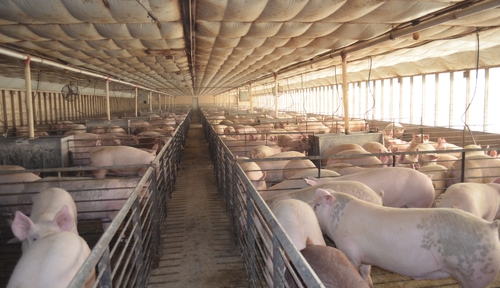Pigs will be pigs.
They eat, drink and poop, and when hundreds are confined in a closed hog facility the dust that’s stirred up contains bacteria that cause lung disease in farm workers.
Physicians report an increase in upper and lower respiratory problems among farm workers, who might spend all day in the loud and dusty confinement facilities. It’s estimated that more than one-third of those who work in swine and dairy facilities develop lung disease related to dust exposure.
Helping farmer’s health
UNMC’s Central States Center for Agricultural Safety and Health (CS-CASH) is investigating the fundamental mechanics of chronic inflammatory lung disease associated with inhalation of organic dust.
“We want to understand what happens to the lungs of workers as the industry changes and more people are exposed to organic dusts for longer periods of time,” said Todd Wyatt, Ph.D., professor of environmental, agriculture and occupational health in the College of Public Health.
He and allergist Jill Poole, M.D., associate professor, are investigators of a $750,000 grant from the National Institute for Occupational Safety and Health in the Centers for Disease Control and Prevention (CDC). Deb Romberger, M.D., professor, pulmonary, will conduct outreach activities to help prevent farmers from getting respiratory disease.
Dr. Poole, who treats many farmers for such respiratory problems as chronic bronchitis, asthma and chronic obstructive pulmonary disease (COPD), said there are no medications on the market that work well.
“We struggle to control the symptoms. That’s why this study is so important.”
Lung disease part of “triple whammy”
In deaths caused by lung disease, smoking and alcohol rank in the top three.
And COPD now follows heart disease and cancer as the third most deadly disease in the world.
“Multiple exposures are possibly the bigger problem,” Dr. Wyatt said. “We have an innate defense system in the lungs in which inhaled viruses, bacteria, and other particles are effectively removed through the action of mucociliary clearance. Throw in cigarette smoke or alcohol exposure and the lung’s normal defense system is severely compromised.”
Add the complexity of individual genetics — why two people exposed to similar environments react differently — and researchers are left with multiple variables.
“We hope our research will lead to new treatments to reduce airway inflammation before it causes disease in workers.”
